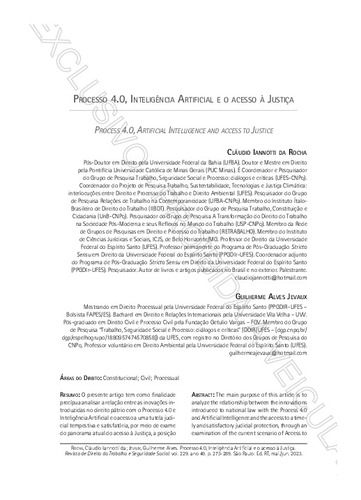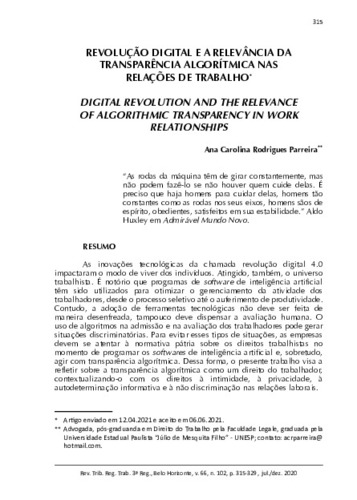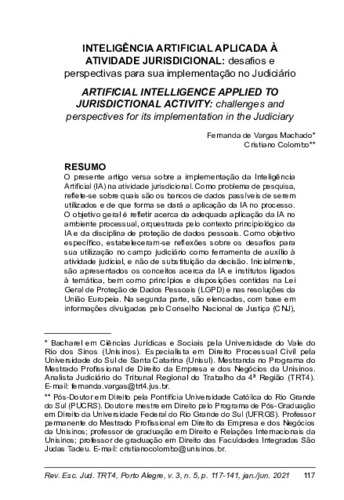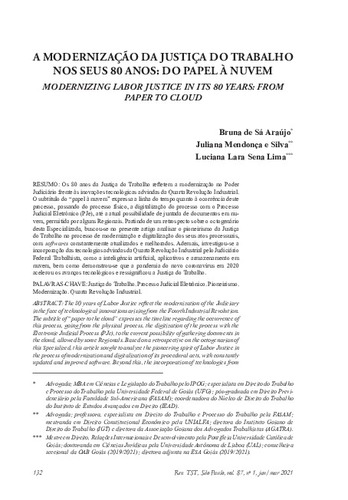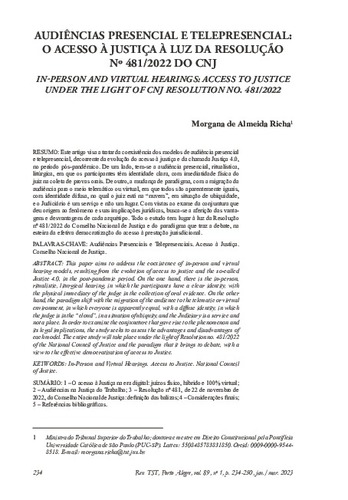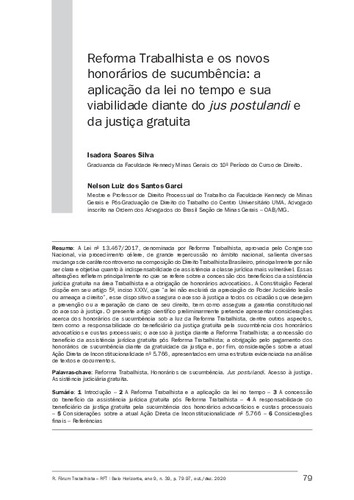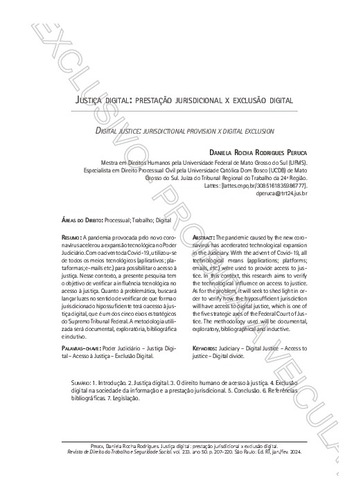Artigo de periódico
Processo 4.0, inteligência artificial e o acesso à justiça
| dc.contributor.author | Rocha, Cláudio Jannotti da | |
| dc.contributor.author | Jevaux, Guilherme Alves | |
| dc.date.accessioned | 2024-04-03T20:47:10Z | |
| dc.date.available | 2024-04-03T20:47:10Z | |
| dc.date.issued | 2023-06 | |
| dc.identifier.citation | ROCHA, Cláudio Jannotti da; JEVAUX, Guilherme Alves. Processo 4.0, inteligência artificial e o acesso à justiça = Process 4.0, artificial intelligence and access to justice. Revista de direito do trabalho e seguridade social, São Paulo, v. 49, n. 229, p. 273-289, maio/jun. 2023. | pt_BR |
| dc.identifier.uri | https://hdl.handle.net/20.500.12178/231238 | |
| dc.description.abstract | [por] Analisa a relação entre as inovações introduzidas no direito pátrio com o processo 4.0 e inteligência artificial e o acesso a uma tutela judicial tempestiva e satisfatória, por meio de exame do panorama atual do acesso à justiça, a posição vanguardista possibilitada pela legislação nacional e análise do atual estado de desenvolvimento da Inteligência Artificial, suas reais capacidades e restrições, de forma, assim, a evitar possíveis dificuldades na sua utilização no judiciário brasileiro, como vieses algorítmicos e o black box algorítmico. Por fim, será examinado como a inteligência artificial é hoje regulamentada e usada pelos tribunais e pelo Conselho Nacional de Justiça, com a devida atenção às garantias fundamentais inerentes ao processo. Para a elaboração deste artigo, utilizou-se o método dedutivo, na perspectiva qualitativa, a partir da pesquisa bibliográfica. | pt_BR |
| dc.description.abstract | [eng] The main purpose of this article is to analyze the relationship between the innovations introduced to national law with the process 4.0 and artificial intelligence and the access to a timely and satisfactory judicial protection, through an examination of the current scenario of access to justice, the position avant-garde approach made possible by national legislation and analysis of the current state of development of artificial intelligence, its real capabilities and restrictions, in order to avoid possible difficulties in its use in the Brazilian judiciary, such as algorithmic biases and the algorithmic black box. Finally, it will be examined how artificial intelligence is currently regulated and used by the courts and the National Council of Justice, with due attention to the fundamental guarantees inherent in the process. For the elaboration of this article, the deductive method was used, in the qualitative perspective, from the bibliographic research. | pt_BR |
| dc.description.tableofcontents | Acesso à justiça -- Inteligência artificial, big data e o processo 4.0 | pt_BR |
| dc.language.iso | pt_BR | pt_BR |
| dc.relation.ispartof | Revista de direito do trabalho e seguridade social: vol. 49, n. 229 (maio/jun. 2023) | pt_BR |
| dc.subject | Acesso à justiça, inovação tecnológica, Brasil | pt_BR |
| dc.subject | Prestação jurisdicional, inovação tecnológica, Brasil | pt_BR |
| dc.subject | Poder judiciário, inovação tecnológica, Brasil | pt_BR |
| dc.subject | Processo eletrônico, Brasil | pt_BR |
| dc.subject | Inteligência artificial, Brasil | pt_BR |
| dc.subject | Inteligência artificial, regulamentação, Brasil | pt_BR |
| dc.title | Processo 4.0, inteligência artificial e o acesso à justiça | pt_BR |
| dc.title.alternative | Process 4.0, artificial intelligence and access to justice | pt_BR |
| dc.type.genre | Artigo de periódico | pt_BR |
| dc.identifier.rvbisys | 001246550 | |
| dc.relation.ispartoflink | https://hdl.handle.net/20.500.12178/228919 | pt_BR |
Ce document figure dans la(les) collection(s) suivante(s)
-
Artigos9566


